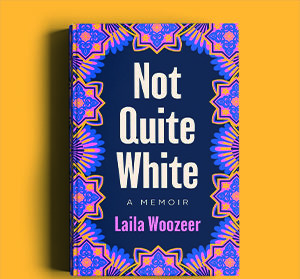Tilly Foulkes reviews Not Quite White by Laila Woozeer, a memoir tackling the alienation and isolation which comes with growing up as a person of colour in North Wales, and the UK more broadly.
“When I wrote stories, I made all the characters white – usually blonde and blue-eyed, with clearly English names.”
Not Quite White – the debut book from musician, activist and writer Laila Woozeer – examines racist structures in the UK and how they affect the identities of British people of colour. Woozeer focuses particularly on the difficulty of constructing an identity as a young mixed race person in Britain, a society that upholds whiteness as the ideal. Though advertised as a memoir, the book weaves insightful cultural criticism, a fascinating family history and a sharp analysis of colonialism and its lasting effects on former colonised people and their descendants.
Spending their childhood in North Wales – around the Wrexham area – Woozeer often contemplated whether they existed at all. A muddled understanding of their family history and the severe lack of mixed race women on TV (and certainly even less in rural Wales, with the latest government diversity statistics stating that 97.5% of people in North Wales identify as white) – Woozeer’s understanding of their own identity fractured and warped, while their sense of self was almost non-existent. They write, “I needed something tangible to prove I was not a mistake and was a person purposefully in the world.” While the memoir is often witty, it’s moments like these that depict the harrowing reality of growing up non-white in the UK – alienated and confused, Woozeer searches desperately to form an identity. These feelings last throughout their school years – even after moving from Wales to London. They only truly begin to make sense of themselves once they reach university.
Woozeer is keen to emphasise that though they felt extremely connected to Wales – and did identify as Welsh – they were missing that connection with other mixed race people. Their first experience of this kind of connection was with Aladdin’s Princess Jasmine – whom as a child, Woozeer was enamoured with: “Jasmine was strong and brave. She took charge…Jasmine had a tiger.” Eager to find more people like themselves and Jasmine, they got to work to find out more about Agrabah: only to discover not only is it fictional, but it’s also an accumulation of Eastern stereotypes and offensive caricatures. Neither Jasmine nor Aladdin are voiced by Arabic people, and the film in its entirety is a mishmash of non-Western cultures – blending them all together as though there’s no difference. As a child, Woozeer is forced to confront their own identity and the question of their own existence. As an adult, the author untangles the complexity of representation: though Princess Jasmine brought endless comfort to them as a child, was the characterisation more harmful than not?
Although identity is at the root of the memoir, arguably the need for connection is the core driving force. Without at least some understanding of who you are, the quest to make real, profound connections can be difficult. It is a necessity for Woozeer to feel united with others (as it is for anyone), but it’s a laborious process for them. They aren’t white, so they immediately feel ostracised by their white mother’s family; but their British upbringing simultaneously separates them from their Mauritian relatives, too. When they create their own community at university, they are still faced with similar issues: despite being an educated, experienced, qualified, and talented musician, they find themselves falling behind their peers when it comes to booking gigs and getting jobs. Their white friends are puzzled by this; not fully comprehending the setbacks Woozeer faces constantly as a woman of colour in a deeply racist society.
But if anything, Not Quite White proves over and over again that Woozeer is relentless when it comes to forging their life and getting what they want and – crucially – deserve. The world was built on the exploitation of people of colour, and the structures that uphold society continue to suppress their opportunities for advancement. This memoir doesn’t shy away from the horrors of colonialism – instead demonstrating the way that it is ingrained in the history and lives of people of colour in the UK. Woozeer’s insights into their life, the world around them, and the culture they grew up in is often hilarious, and their voice is distinctive when approaching these topics.
Largely, the memoir is a moving piece of literature discussing and highlighting the key issues facing people of colour in the UK. But it’s also much more than that – it’s an eloquent portrayal of self-discovery and building your identity in a society that is eager to dismantle your existence at every turn, emphasising the importance of community in building a solid foundation.
Not Quite White by Laila Woozeer is available via Simon & Schuster.











